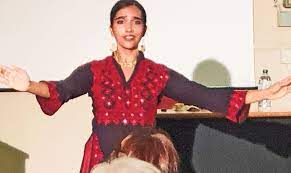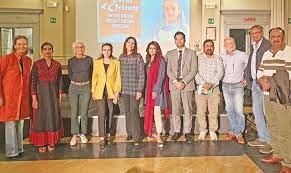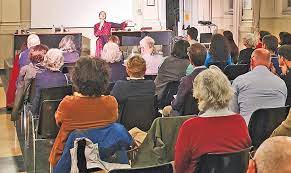Shining a light on Pakistan in Italy

Aliya Salahuddin
Milan: In a hall full of Italians, deep in the heart of Milan, there is a certain incredulity in listening to the story of Heer Ranjha, told in lyrical fantasy by a German professor of Urdu literature – in Italian. Professor Thomas Dähnhardt had a smile transfixed on his face as he led his audience to appreciate the nuanced idea of ishq that went beyond love. “What happens when two lovers cannot unite?” He asked the hall as if addressing the question to his class at University Ca’ Foscari in Venice where he is the professor of Urdu and Hindi language and literature.

When lovers cannot unite – he went on to say – their love blossoms in their imaginations and it is only hope for union, therefore, lies in the hereafter. For all of us who grew up with this cultural and literary reference, this kind of devotion, or a hopeful separation, became the real essence of love. Whether we are aware of it or not, it lies somewhere deeply buried in our layered consciousness. I wondered then, sitting in the Milanese Hall, how this idea may have landed with the present audiences.
Moments later, we were treated to Bulleh Shah’s words to the sounds of Abida Parveen’s Tere ishq nachaya, kar thayyan thayyan thayyan… Prof Dähnhardt had a difficult task ahead. He had to give an Italian audience a taste of the kind of poetry and poetic traditions that ultimately formed the spirit and culture of the Pakistani people. And he had 30 minutes to walk us from Bulleh Shah to Ahmed Faraz while also explaining, along the way, how the poets’ words represented and referenced folk stories, divinity, politics, the struggle for social change and became the voice of the nation’s conscience.
The event was organised by the Italian Friends of The Citizens Foundation, an organisation that was set up over a decade ago to create awareness on the issue of education in Pakistan and raise funds for The Citizens Foundation (TCF).
Over the last three decades, TCF has successfully galvanised Pakistanis abroad and at home to make generous donations for its almost two thousand schools across the country. Pakistani volunteers in various parts of the world organise awareness and fundraising events. But TCF’s Italian Chapter, has a unique aspect to it. It wasn’t set up by Pakistanis. It was set up by a group of Italian women, led by the Italian-American Gretchen Romig Crosti.
In the early ’90s, Gretchen and Asma Khan became friends in Milan as young mothers of little kids. Asma, a Pakistani, later moved back to her home country but the two remained in touch. Much later, in 2010 when devastating floods hit Pakistan, Gretchen wanted to send some money for relief work. She contacted Asma who suggested the Citizens Foundation and sent Gretchen information about its work which really impressed her.

Three years later, with the ‘Italian friends’ chapter co-founded with several like-minded friends, Gretchen made her first trip to Pakistan to learn more about the work of the organisation. She visited her first TCF school in Karachi and later, the chapter adopted the Nathoki TCF School just outside Lahore.
Since then, I have watched with absolute admiration how a group of Italian women meet regularly to plan and execute art exhibitions, cultural events, Christmas markets, Iftar evenings, and fundraising galas. They volunteer their time, money, love and effort for a country far away and to help people they have never met.
Every few weeks, they gather around a table at Gretchen’s house to discuss milestones, budgets, and plans for organisational expansion from PowerPoint presentations and detailed accounts. They log onto hours-long meetings over zoom to listen to Marta Righetti, the young manager of the Italian Friends chapter, pore over line items, challenges and future plans. They count their pennies, cook for events to save money, pack every Christmas gift, never forgetting to add the final touch of a well knotted ribbon. Their families and friends buy products at the fundraising markets, attend galas and donate money and tap into their networks to find grand venues at low cost, sponsorships and lottery gifts. It’s a village. And it is all done to collect funds for the children of a country that many of them have never even been to.
However, the success of raising a sizeable sum of money comes with a prerequisite. Before you can influence people by sharing the impact of the organisation’s work, there is the earlier step of introducing them to Pakistan in such a way that people care about it. It is here that the language of culture of used. Culture is not only a natural ally to education, but also the language of universality and diversity worth learning and communicating through.
This is why presenting Pakistan to Italians through the language of poetry just seemed to be the natural way to describe a large, layered country. This is why the story of the spirit of the country and its people needs to be told through the words of Waris Shah, through stories of lovers beset with Firaq who cannot unite in this life and, therefore, pine for a union in the hereafter. The kafis from Bulleh Shah, the mysticism of Shah Abdul Latif Bhitai, the nationalism of Iqbal with its religious, spiritual and social interpretation against colonialism, the rebellion of Faiz Ahmed Faiz – all of this together forms the mould that responds, to some extent, to the curious question: who are the Pakistani people?
And there, at the event in Milan, the most reasonable segue from the professor’s poetic interpretation of a vast land was the story of one man, a Pakistani immigrant who came to Italy three decades ago. The speaker, Ejaz Ahmad, used the platform to perfection, sharing his experience as an immigrant in Italy in the form of a letter to his father. It was peppered with emotion, laughter and acute observations that had the audiences nodding their heads to the nuanced descriptions that seemed all too familiar, but seen from an outside perspective. Ahmad is a journalist committed to inter cultural exchange and also performs the very important role of a cultural mediator. This is a title given to people who work as a bridge between the immigrants and the land where they have arrived.
Ahmad played the same mediator in the room. Since the last couple of years, Italian headlines and political discussions are consumed by the topic of immigration and the rising number of immigrants reaching its shores. Under the heavy shade of the anti-immigration government in the country, Ahmad’s talk was a light hearted response from a person who finds himself to be equal parts Italian and Pakistani. “It takes about 15 years to start dreaming in the language of your new country,” he said. And now, he dreams, writes, speaks, works and parents – all in Italian.
The beautiful evening of art, education and culture ended with a performance by the dancer Suhaee Abro, who is now based in Italy. She began her act with the hauntingly beautiful music composed by Jessica Moss, set to various couplets by Mirza Ghalib, read out by Suhaee herself, each followed by the Italian translation and recitation by Andrea Maffi. The most dramatic performance named Saawan (by singer Mame Khan) had the audience mesmerised as Suhaee’s expression, movements and gestures conveyed the ecstasy felt by those who dwell in deserts and dry lands, over the blessing of rainfall.
Again, when a feeling so removed from the experience of the present audiences can be so aptly and emotionally described through music and dance, it has the power of creating an immediate relationship between two cultures.
I have attended many events outside Pakistan where speeches begin with the creation of the country, recount its political history, name the provinces and the highest peaks, celebrating its diverse landscape and four seasons. Perhaps such efforts serve the purpose of providing a little fact book to people but they lack passion and heart. And without those, we miss the opportunity to form a lasting connection with the audience.
What music, art, culture and literary expression convey is deeper and more meaningful than any other flag waving exercise. It makes a profound impact on societies that care for beauty and it is in this space that we can often easily relate with each other.





